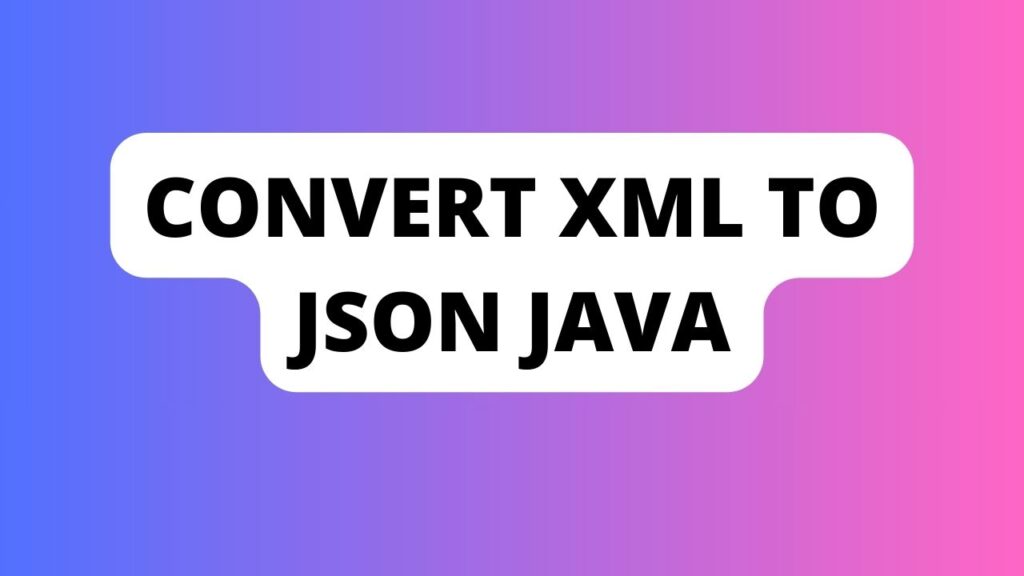I. Introduction to XML and JSON
Understanding XML
Convert Xml to Json Java XML, or eXtensible Markup Language, serves as a universal format for data storage and transmission. Its hierarchical structure allows flexible data organization.
Exploring JSON
JSON, standing for JavaScript Object Notation, is a lightweight data interchange format. Its simplicity and human-readable format make it popular for data interchange.
Importance of Conversion
The need to convert XML to JSON often arises in data integration scenarios, where systems rely on different data formats. Java offers robust solutions for this transformation.
II. Basics of XML to JSON Conversion
XML Hierarchical Structure
XML structures data hierarchically with nested elements, allowing complex data representation.
JSON Structure Overview
JSON presents data in key-value pairs, arrays, and objects, offering simplicity in representation.
Converting XML to JSON: Overview
This conversion involves mapping XML elements to JSON attributes, a process facilitated by Java libraries and techniques.
III. Techniques for XML to JSON Conversion
Using Java Libraries
Java provides specialized libraries simplifying XML to JSON conversion, reducing manual efforts.
Manual Conversion Process
Understanding the manual process helps in grasping the underlying logic behind the transformation.
XML Parsing in Java
Java facilitates XML parsing through APIs like SAX, DOM, or StAX, allowing efficient traversal of XML data.
JSON Generation in Java
Java libraries like Jackson or Gson aid in generating JSON from Java objects or XML structures.
IV. Java Tools and Libraries
Java-Based Converters
Explore tools like JAXB, which seamlessly convert XML to Java objects, simplifying the transformation.
Popular Libraries Comparison
Comparative analysis of libraries like Jackson, Gson, and others, emphasizing their features and suitability.
Benefits of Java Tools
Highlighting the advantages of leveraging Java tools for efficient and accurate XML to JSON conversion.
Why Convert XML to JSON using Java?
The conversion from XML to JSON in Java unlocks numerous benefits, notably streamlined data handling, reduced redundancy, and enhanced readability, crucial in modern software systems.
Understanding XML and JSON
XML follows a tree structure with tags, attributes, and data, whereas JSON uses key-value pairs, arrays, and objects, ensuring compactness and simplicity.
Java Libraries for XML to JSON Conversion
Among the prominent libraries for this conversion, options like Jackson and Gson stand out, offering versatile functionalities and robust support.

Step-by-Step Guide: Converting XML to JSON
Setting Up Environment
Begin by configuring the development environment with the necessary libraries and tools for seamless conversion.
Parsing XML
Efficiently parse the XML data, extracting essential components for the conversion process.
Generating JSON
Transform the parsed XML data into its JSON counterpart using the chosen Java library, ensuring accuracy and fidelity.
Error Handling
Address common errors that developers encounter during conversion, presenting effective solutions for a smoother workflow.
Best Practices
Optimize the conversion process by adhering to industry best practices, enhancing performance and reliability.
Use Cases
Explore real-world scenarios showcasing the practical applications and advantages of XML to JSON conversion in Java.
Performance Comparison
Compare the performance metrics between XML and JSON in Java, highlighting the efficiency of JSON for certain use cases.
Security Considerations
Delve into security vulnerabilities and precautionary measures essential for safeguarding data integrity during conversion.
Future of XML and JSON
Discuss emerging trends, advancements, and potential future directions for both XML and JSON in the data handling landscape.
FAQs
How do I convert XML to JSON in Java? To convert XML to JSON in Java, utilize libraries like Jackson or Gson for seamless conversion.
Which Java library is best for XML to JSON? The choice between Jackson and Gson depends on specific project requirements, but both are reliable options.
What are the advantages of using JSON over XML? JSON offers a more concise and readable format, making it easier to work with in modern software systems compared to XML.
Can I preserve XML structure while converting to JSON? Yes, it’s possible to retain the XML structure in the converted JSON for better readability and understanding.
Is it possible to convert large XML files to JSON in Java efficiently? Yes, leveraging efficient parsing techniques and optimized libraries enables efficient conversion, even with large XML files.
How can I handle complex XML structures during conversion? Ensure thorough understanding of the XML structure and utilize appropriate parsing methods offered by Java libraries for smooth conversion.
Conclusion
In summary, converting XML to JSON using Java unlocks a streamlined approach to data transformation, enhancing readability, reducing redundancy, and optimizing data handling in modern software systems.
